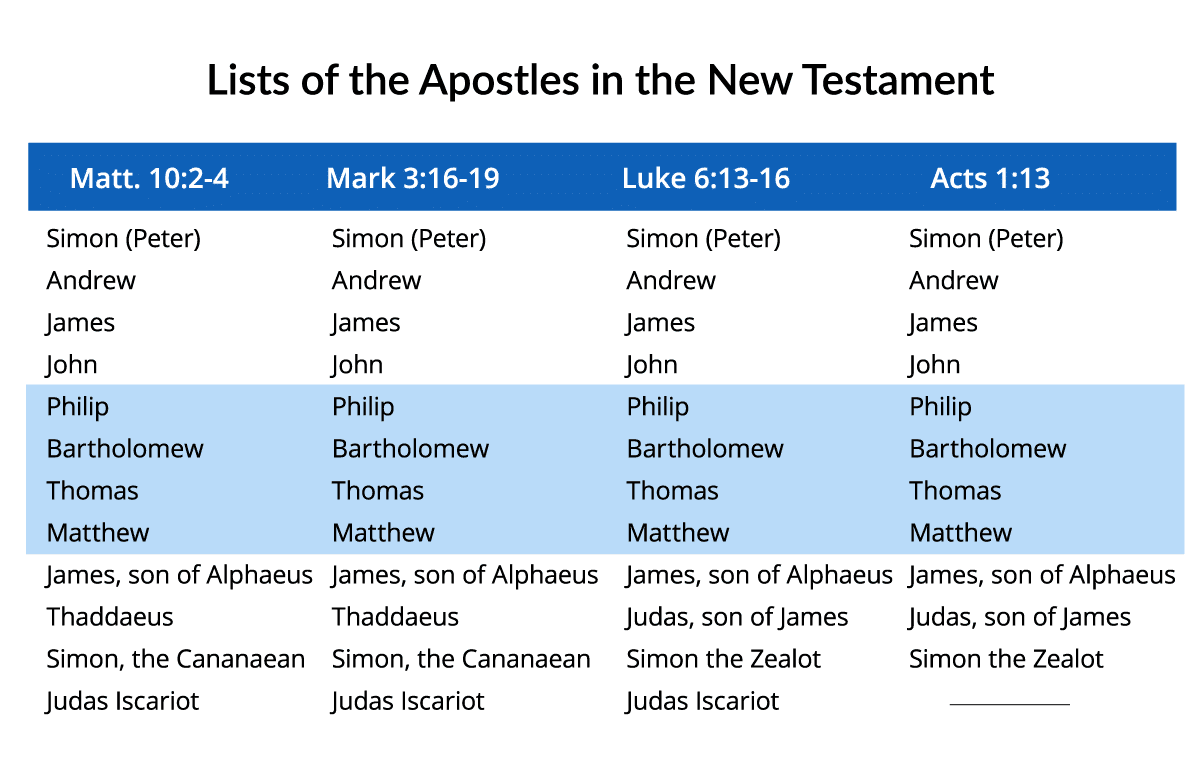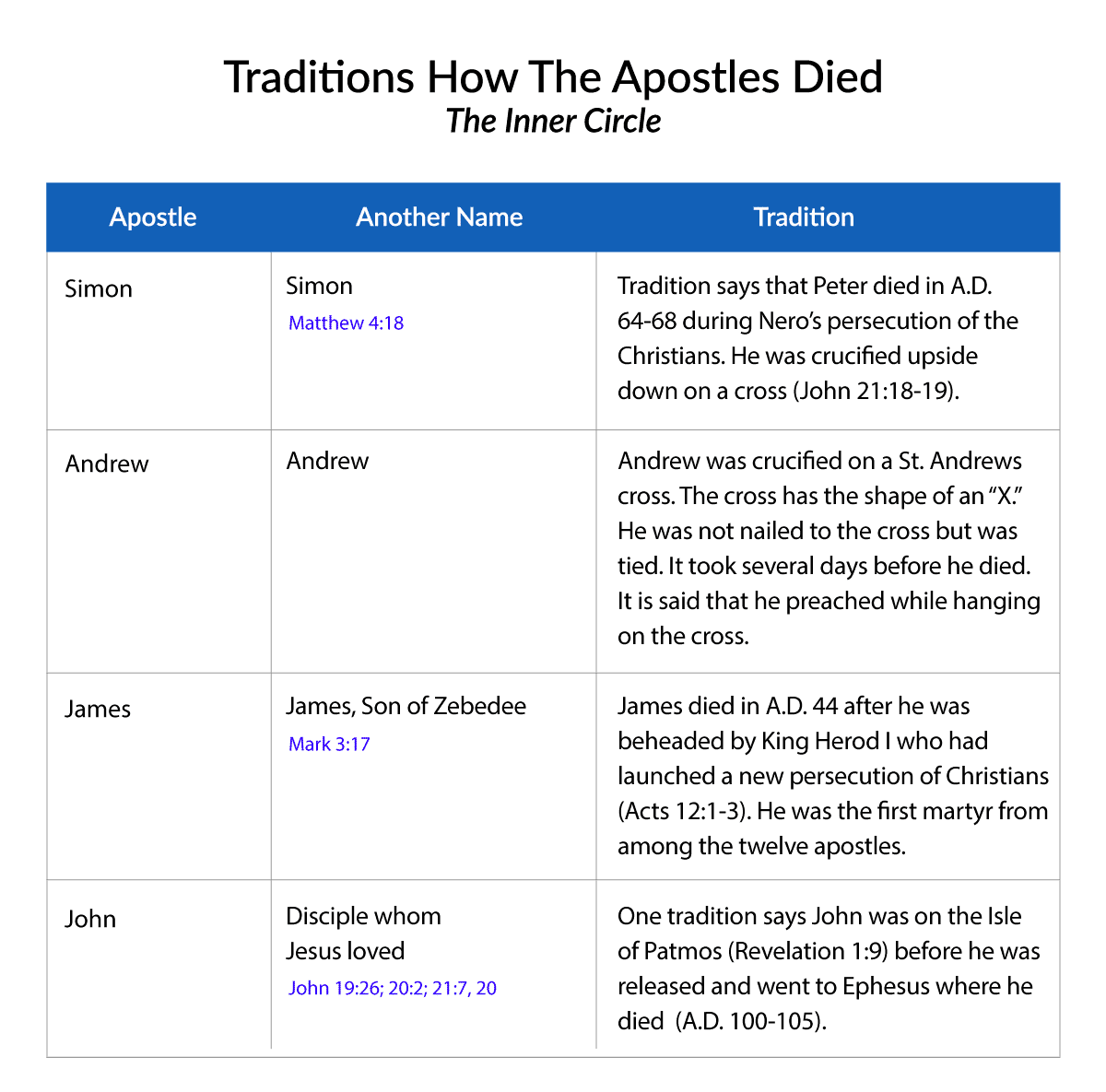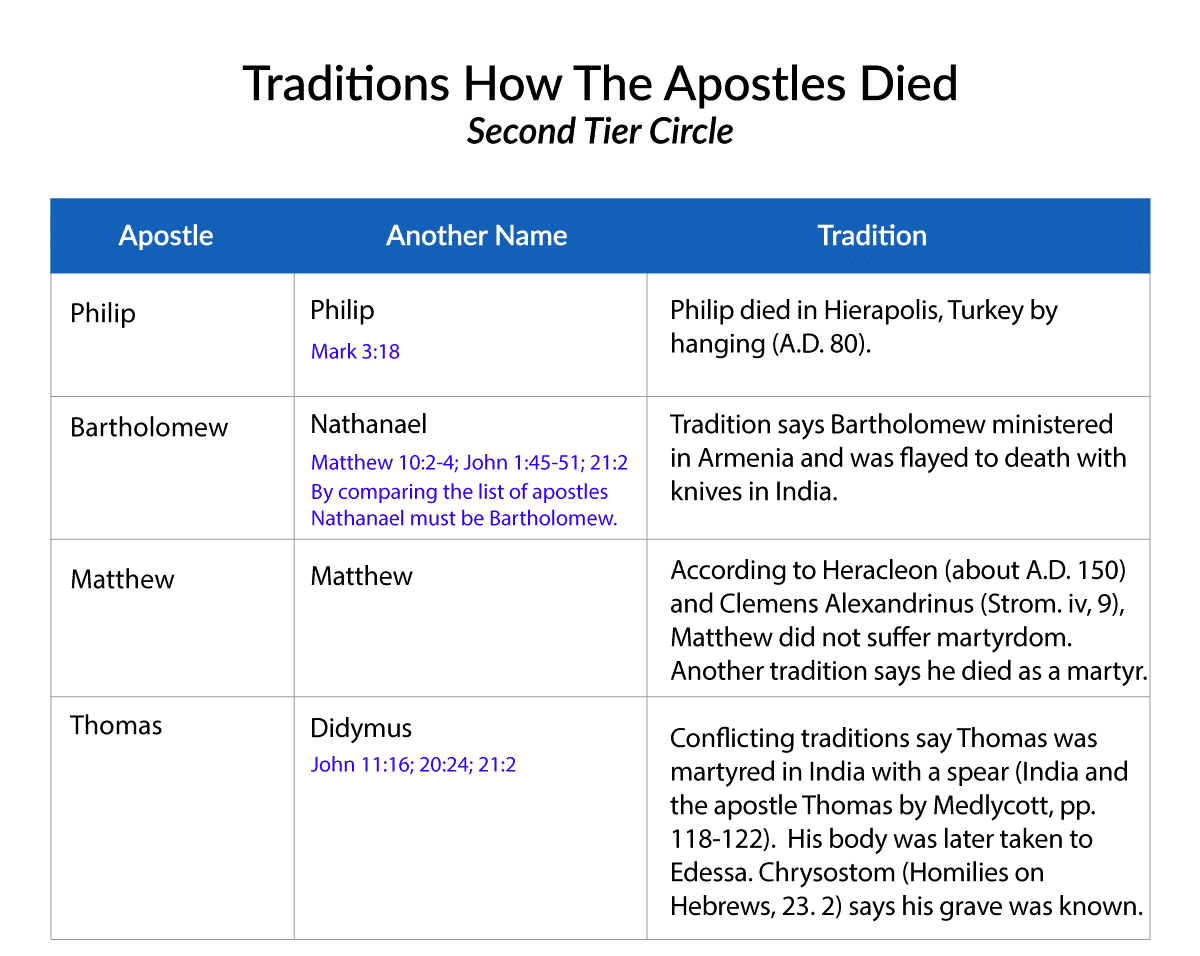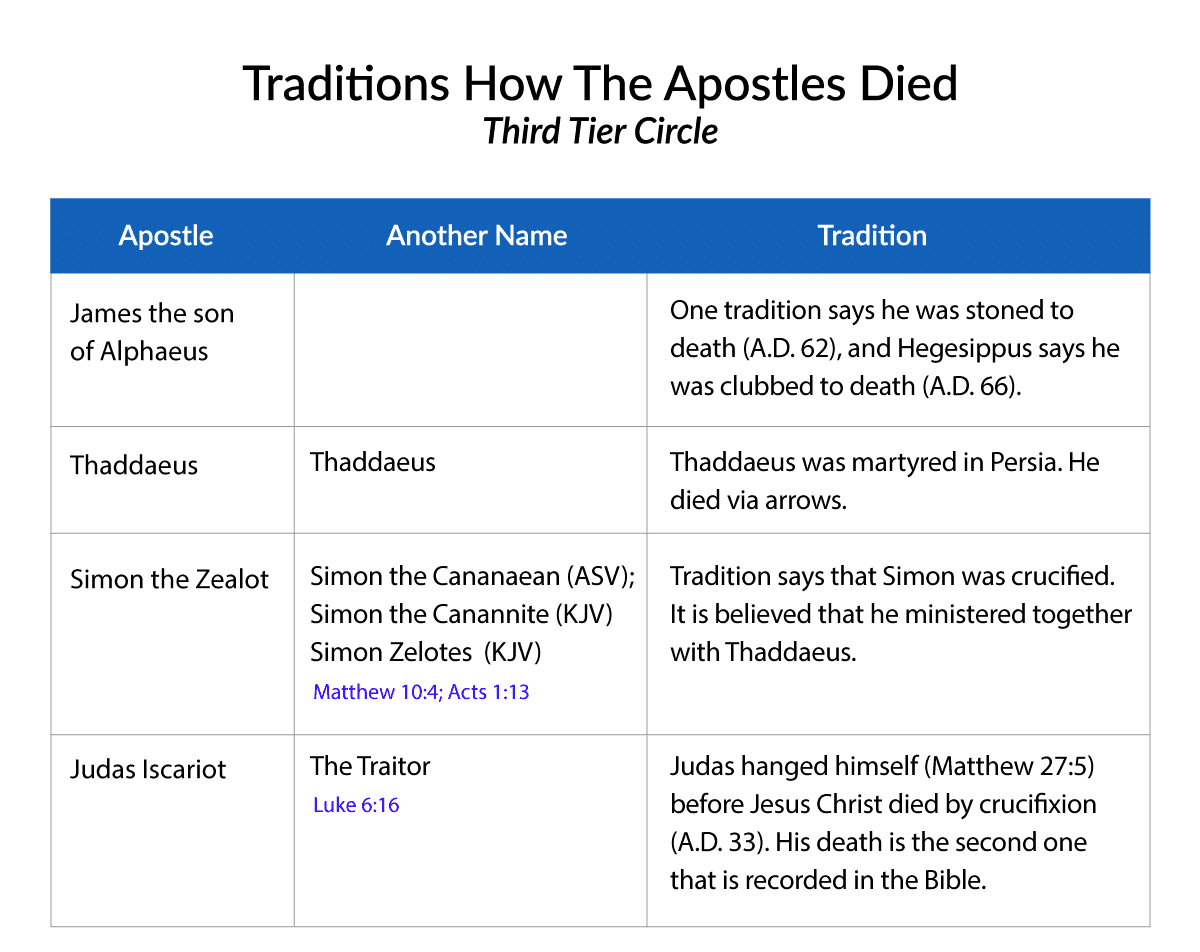Bible Question:
How did the apostles meet their deaths?
Bible Answer:
The Bible does not tell us how each apostle died. It records the death of only two apostles. Therefore, we must depend upon historical information for the other apostles in order to answer the question, “How did the twelve apostles die?” The following chart provides a list of the apostles as presented in three of the gospels and the book of Acts. The apostles are grouped by fours.

Apostles — Peter, Andrew, James, and John
The first group of four apostles was Jesus’ inner group. They became His followers shortly after the beginning of His ministry. John 1:35-42 records the occasion on which they responded to Jesus by believing that He was the promised Messiah. Jesus asked them to follow Him three times. The first time was after they believed. The second time occurred when they were fishing (Mark 1:14-20) and the third time occurred after another time of fishing (Luke 5:1-11). On that occasion they finally left everything and followed Jesus. At least three of them were invited to join Jesus when He raised Jairus’ daughter from the dead (Mark 5:37-43). Jesus also invited only Peter, James, and John to join Him on the Mount of Transfiguration (Matthew 17:1-13). All four privately asked Jesus questions on the Mount of Olives (Mark 13:1-8). Peter, James, and John were asked to wait for Jesus while He prayed in the Garden of Gethsemane (Matthew 26:36-37). Lastly, Peter and John were in discussion with Jesus prior to His departure to heaven (John 21:12-23). John was the disciple Jesus asked to care for His mother (John 19:26-27). It should be noted that James and John had the same father, Zebedee (Matthew 10:2) and Peter and Andrew were brothers (Matthew 10:2). These men were part of Jesus’ inner group.

Since the Bible does not report how all of the apostles died, we cannot be confident how some of them died. Therefore, we look to traditions about their deaths. But it is important to note that there are multiple conflicting traditions about how some apostles died. So, which tradition is correct? For example, tradition claims that Peter died in A.D. 64-68 during Nero’s persecution of the Christians , and that he was crucified upside down on a cross (John 21:18-19). Tradition also states that Andrew was crucified on a cross that today we call the St. Andrews cross. The cross has the shape of an “X.” He was not nailed to the cross but was tied. It took several days before he died. It is said that he preached while hanging on the cross. The apostle James died in A.D. 44 after he was beheaded by King Herod I who had launched a new persecution of Christians (Acts 12:1-3). He was the first martyr from among the twelve apostles. One tradition says John was on the Isle of Patmos (Revelation 1:9) before he was released and went to Ephesus where he died (A.D. 100-105).
Apostles — Philip, Bartholomew, Thomas, and Matthew
The second group of four apostles included two men who were into details. That is, they appear to have been analytical men: Thomas and Matthew. Thomas is known as Didymus (John 21:2) and “Doubting Thomas” because He questioned that Jesus had actually returned to life (John 20:26-29). He wanted to place his finger into Jesus’ wounds to confirm that the wounds were real. Matthew was a tax collector for the Roman Empire. These two men were probably technically oriented. It appears from John 1:35-51 that Philip and Bartholomew believed in Jesus Christ as their Messiah on the same day that Peter, Andrew, James, and John did. Bartholomew was also known as Nathanael.

Tradition reports that Philip died in Hierapolis, Turkey by hanging (A.D. 80). Tradition says Bartholomew ministered in Armenia and was flayed to death with knives in India. Supposedly, Matthew died a martyr’s death in Ethiopia. McLintock and Strong state,
Chrysostom mentions [Thomas’] grave at Edessa as being one of the four genuine tombs of apostles, the other three being Peter, Paul, and John (Hom. in Heb. 26). With his burial at Edessa agrees the story of bis sending Thaddreus to Abgarus with our Lord’s letter (Euseb. Hut. Ecclu. i, 18). According to a later tradition, Thomas went to India and suffered martyrdom there.1
Apostles — James, Thaddaeus, Simon, and Judas
We know very little about the third group of four apostles. We know almost nothing about James the son of Alphaeus from the Bible other than that his father’s name was Alphaeus, and the name of Matthew’s father was also Alphaeus (Matthew 9:9; Mark 2:14). So they may have been brothers. The only information we have about Thaddaeus is that he was an apostle (Matthew 10:3; Mark 3:18). Simon the Cananaean was also called Simon the Zealot (Matthew 10:2; Acts 1:13). The Zealots were anti-Rome and were politically motivated. One wonders how Simon felt about Matthew, who would have been considered a traitor by the Jews because he was a tax-collector for Rome. The Bible reveals nothing significant about this apostle. Judas Iscariot was the traitor (Matthew 10:4) who later hung himself (Matthew 27:3-6) and was therefore not listed with the disciples in the book of Acts.

One tradition says James the son of Alphaeus was stoned to death (A.D. 62), and Hegesippus says he was clubbed to death (A.D. 66). Thaddaeus was reportedly martyred in Persia. He died via arrows. Tradition says that Simon the Zealot was crucified. It is believed that he ministered together with Thaddaeus. Judas hanged himself (Matthew 27:5) before Jesus Christ died by crucifixion (A.D. 33). His death is the second one that is recorded in the Bible.
It is amazing that we know so little about the men who “turned the world upside down.” Jesus had prepared them and God used them in a powerful way to alert the world to His good news that Jesus Christ had come into the world to save sinners. These men gave their lives and died so that all could hear the good news that the forgiveness of sins is free to anyone who believes in Jesus Christ and accepts Him as Lord and Savior.
References:
1. John McClintock and James Strong. Cyclopedia of Biblical Theological, and Ecclesiastical Literature. Baker Book House. 1981, vol. X, p. 368.
Suggested Links:
Searching For GodHow were the apostles chosen? — Do apostles exist today?
What is the role of an apostle today? – Who is an apostle?
Did the apostles contact each other after they left Jerusalem?
What is the Apostles’ Creed of the third or fourth century A.D.?
Were people saved before the apostles?
The Third Call Of The Disciples